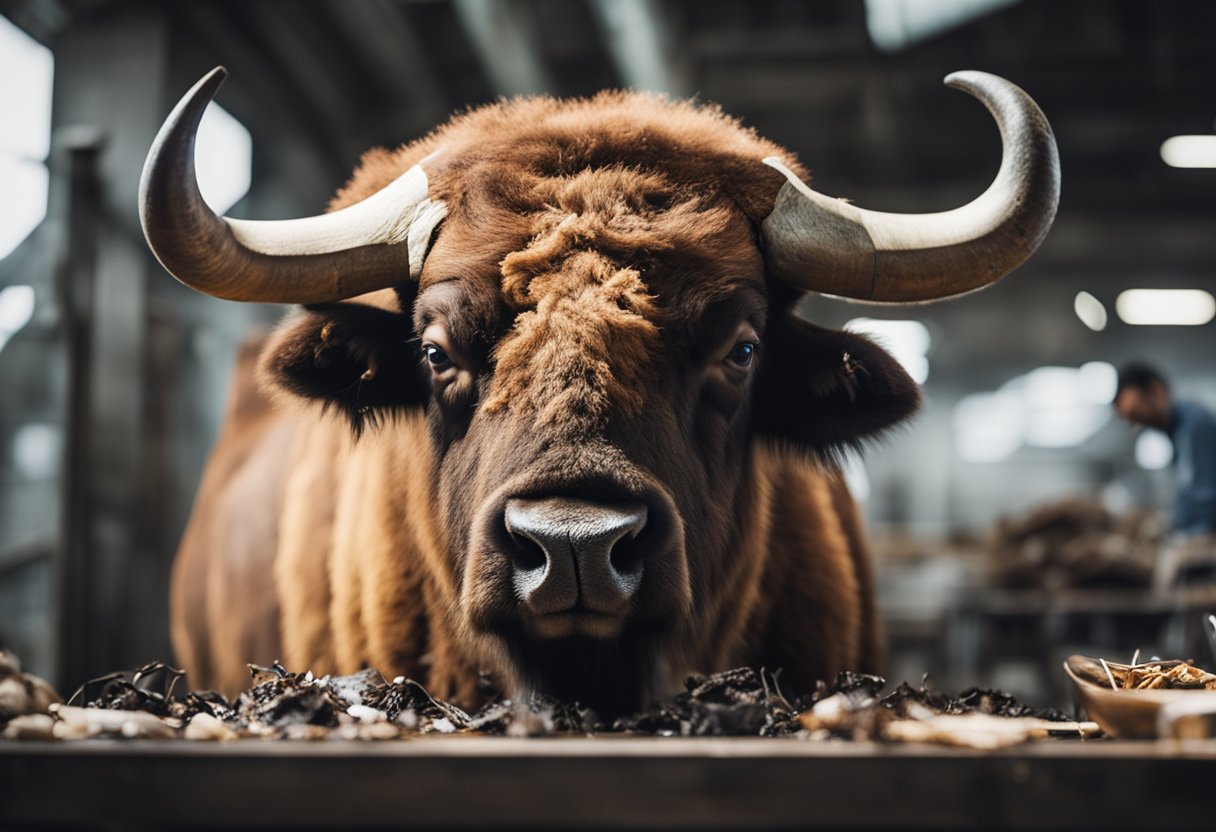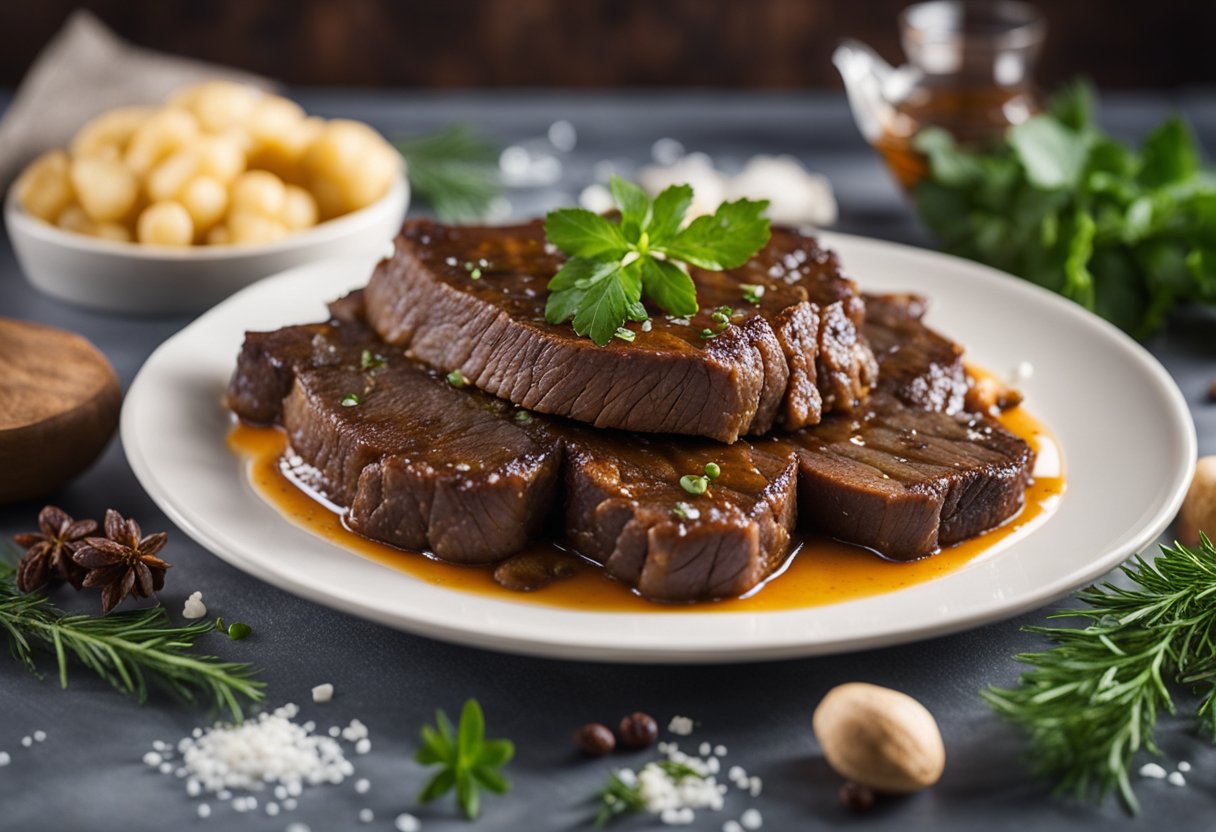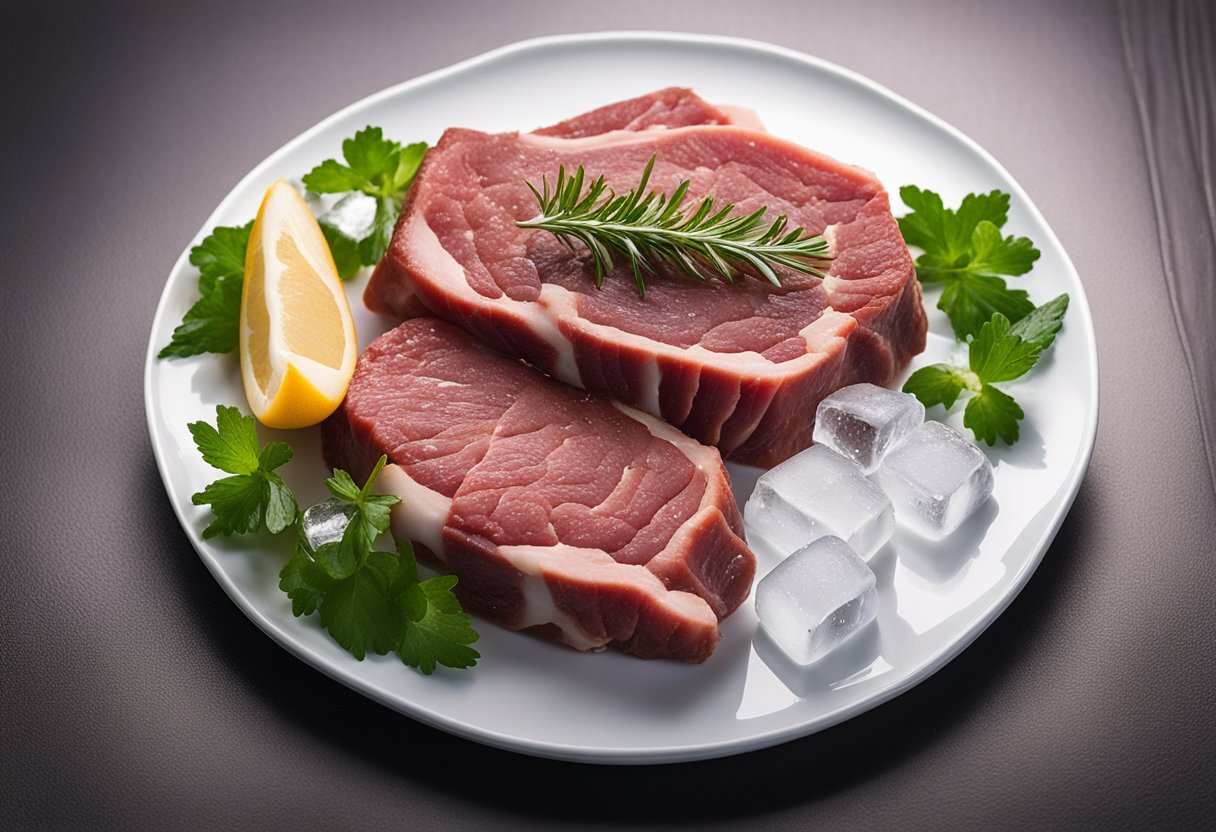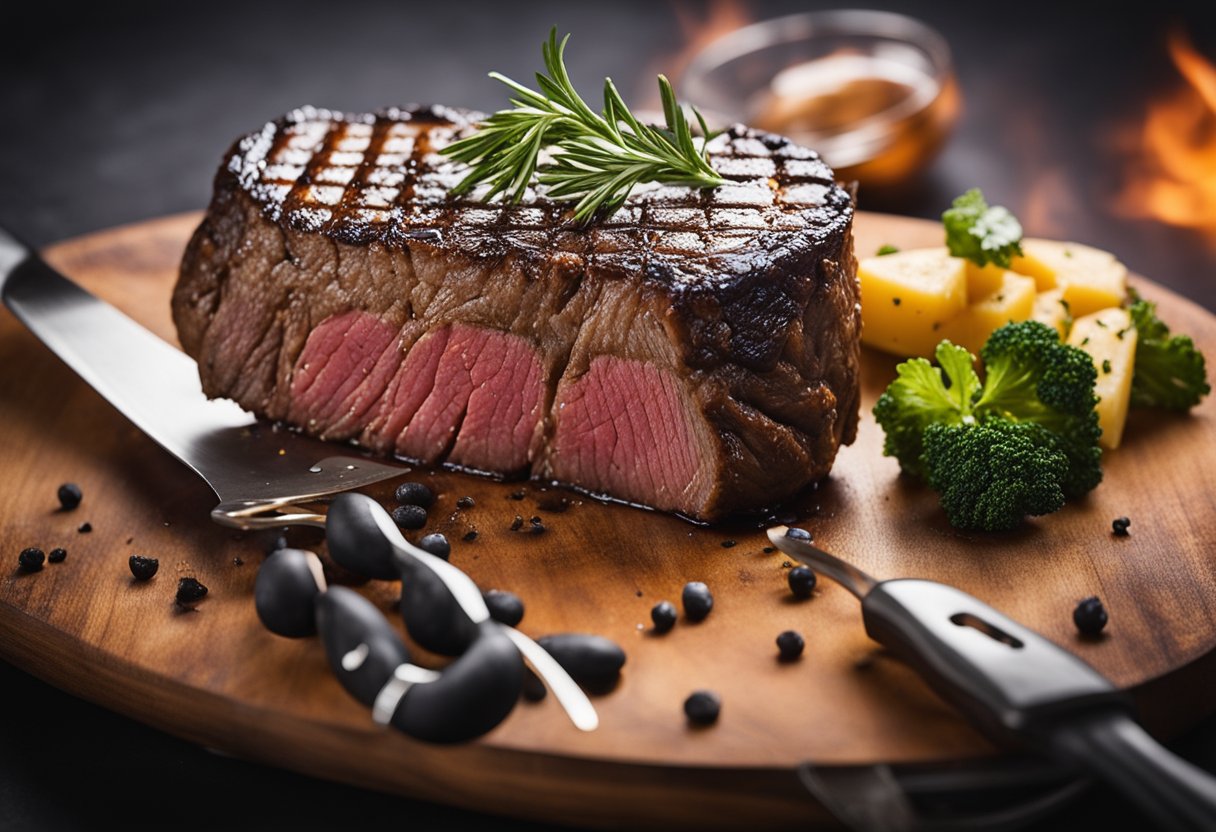Bison meat has become increasingly popular in recent years, thanks to its unique taste and health benefits. Many people are curious about what bison meat tastes like and how it compares to beef.
As someone who has tried both, I can tell you that bison meat has a distinct flavor that’s hard to describe. In this article, I’ll share my experience with bison meat and answer some of the most common questions about it.

Understanding bison meat is the first step to appreciating its taste. Bison, also known as buffalo, is a large mammal native to North America.
Bison meat is leaner than beef and has a slightly sweet, gamey flavor that sets it apart. It’s also rich in protein, iron, and other essential nutrients, making it a healthy choice for meat lovers.
In the next section, I’ll delve deeper into the flavor profile of bison and how it compares to beef.
Key Takeaways
- Bison meat has a unique, slightly sweet, gamey flavor that sets it apart from beef.
- Bison meat is leaner and healthier than beef, making it a great choice for meat lovers.
- Bison meat is versatile and can be used in a variety of dishes, from burgers to stews.
Understanding Bison Meat
As someone who has tried bison meat, I can attest to the unique taste and texture that it offers. Bison meat is a type of red meat that comes from the American bison or European bison, which is often referred to as buffalo meat.
Compared to beef, bison meat is leaner and has less fat and calories, making it a healthier alternative for those who are watching their weight or have dietary restrictions.
Additionally, bison meat is rich in protein, iron, and other essential nutrients that are necessary for maintaining a healthy diet.
When it comes to taste, bison meat is often described as having a slightly sweet and rich flavor that is similar to beef but with a slightly gamey taste.
Some people also note that bison meat has a lighter flavor and is more tender compared to other red meats, especially if you have been consuming beef for a long time.
The texture of bison meat is also different from beef. Bison meat is leaner and more tender, which means that it cooks faster and can be more sensitive to overcooking.
It is recommended to cook bison meat to medium-rare or medium to preserve its tenderness and juiciness.
In summary, bison meat is a healthy and flavorful alternative to beef that has a unique taste and texture.
It is rich in essential nutrients and is a great option for those who are looking to switch up their protein sources.
Flavor Profile of Bison

As someone who has tasted bison meat before, I can confidently say that it has a unique and flavorful taste. Bison meat has a slightly sweet and rich flavor that is often compared to beef, but with a slightly gamey undertone.
This gamey flavor is not overpowering and can be quite pleasant, especially if you enjoy the taste of other game meats.
Compared to beef, bison meat is leaner and has a lower fat content. This makes it a healthier option for those who are conscious about their diet.
Despite being leaner, bison meat is still very flavorful and juicy. It has a firmer, coarser texture compared to beef, but it is still very tender.
One of the things that I really appreciate about bison meat is its versatility. It can be cooked in a variety of ways and still retain its unique flavor profile.
Whether you grill it, roast it, or make it into a stew, bison meat always tastes delicious.
In summary, the flavor of bison meat is best described as slightly sweet, rich, and slightly gamey. It is a flavorful and healthy alternative to beef that can be enjoyed in a variety of dishes.
Comparing Bison and Beef
As someone who has tried both bison and beef, I can confidently say that they have some similarities and differences in terms of taste and texture.
Taste
Bison meat tends to have a slightly sweeter and lighter taste compared to beef. This is due to the fact that bison is leaner and has less marbling than beef.
The leaner meat also means that bison has a lower fat content, which can contribute to a cleaner and less heavy taste.
On the other hand, beef has a more robust and beefy taste due to its higher fat content. The marbling in beef adds flavor and tenderness to the meat, making it a popular choice for many meat lovers.
Texture
Bison meat has a firmer texture than beef, which can be attributed to its leaner nature. This firmer texture can be a positive for some people who enjoy a meatier bite, while others may prefer the tenderness of beef.
In terms of tenderness, bison is still a tender meat, but it may require slightly more cooking time than beef due to its leaner nature.
Beef, on the other hand, can be cooked to various levels of doneness and still maintain its tenderness due to its higher fat content.
Other Differences
Aside from taste and texture, there are some other differences between bison and beef that may be worth noting.
For example, bison meat is generally considered to be a healthier option than beef due to its lower fat content and higher protein content.
Bison is also a more sustainable meat option as bison farming is more environmentally friendly compared to beef farming.
In terms of price, bison meat is generally more expensive than beef due to its leaner nature and the fact that bison farming is a smaller industry compared to beef farming.
Overall, both bison and beef have their own unique characteristics and can be enjoyed in a variety of dishes. It ultimately comes down to personal preference and what you are looking for in a meat.
Health Benefits of Bison Meat
As someone who has tried bison meat before, I can attest to its unique flavor and texture. But beyond its taste, bison meat also offers a range of health benefits that make it a great addition to any diet.
First and foremost, bison meat is an excellent source of protein. In fact, it contains even more protein than beef, making it a great choice for those looking to increase their protein intake.
Additionally, bison meat is lower in fat than beef, which can be beneficial for those looking to maintain a healthy weight or reduce their fat intake.
Bison meat is also rich in essential nutrients, such as iron, selenium, and vitamin B12. These nutrients are important for maintaining a healthy body, and bison meat can help ensure that you are getting enough of them in your diet.
In terms of calories, bison meat is similar to beef, but its lower fat content means that it is a leaner option overall. This can be especially beneficial for those looking to reduce their calorie intake or maintain a healthy weight.
Finally, bison meat is heart-healthy and can help reduce the risk of heart disease. This is due to its lower fat content and higher protein content, which can help lower cholesterol levels and improve overall cardiovascular health.
Overall, bison meat is a nutritious and delicious option for those looking to improve their health and try something new. Its high protein content, essential nutrients, and heart-healthy properties make it a great addition to any diet.
Bison Meat Cuts and Cooking Methods
When it comes to bison meat, there are several cuts that you can choose from.
Each cut has a unique texture and flavor, and some are better suited for certain cooking methods than others. Here are some of the most popular bison meat cuts and the best ways to cook them:
Bison Steaks
Bison steaks are a popular choice for those who want a meaty, flavorful cut of meat. The ribeye, sirloin, and strip steak are all great options, and they can be cooked to your desired level of doneness.
For the best results, cook bison steaks on a grill or in a cast-iron skillet with a little bit of oil. This will help to sear the meat and lock in the juices, resulting in a tender and flavorful steak.
Bison Roasts
Bison roasts are a great choice for those who want a hearty and meaty meal. The chuck roast, rump roast, and round roast are all great options, and they can be cooked in a slow cooker or in the oven.
For the best results, cook the roast low and slow until it reaches an internal temperature of 145°F. This will help to break down the connective tissue and result in a tender and juicy roast.
Ground Bison
Ground bison is a versatile ingredient that can be used in a variety of recipes. It can be used to make burgers, meatballs, chili, and more.
When cooking ground bison, it is important to use a cooking method that will help to retain the moisture in the meat.
This can be achieved by cooking the meat in a little bit of oil over medium heat until it is browned and cooked through.
Bison Burgers
Bison burgers are a delicious and healthy alternative to traditional beef burgers. When making bison burgers, it is important to handle the meat gently and avoid overworking it.
This will help to retain the moisture in the meat and result in a juicy and flavorful burger. For the best results, grill the burgers over medium-high heat until they reach an internal temperature of 160°F.
In conclusion, bison meat is a delicious and healthy alternative to beef. Whether you prefer steaks, roasts, ground meat, or burgers, there is a bison meat cut and cooking method that is perfect for you.
So why not give it a try and see for yourself what all the fuss is about?
Buying and Storing Bison Meat

As someone who has cooked and eaten bison meat before, I can confidently say that it is a delicious and healthy alternative to beef. But where can you buy bison meat and how do you store it properly?
Where to Buy Bison Meat
Bison meat can be found in many butcher shops and grocery stores. You can also purchase it online from various retailers. When buying bison meat, make sure to look for the following:
- Freshness: Choose bison meat that is bright red and has no discoloration or signs of spoilage.
- Cut: Look for the cut of meat that you want, such as ground bison, bison steak, or bison roast.
- Quality: Choose bison meat that is free-range, grass-fed, and hormone-free.
Storing Bison Meat
Bison meat can be stored in the refrigerator or freezer. If you plan to use it within a few days, store it in the refrigerator. Otherwise, store it in the freezer.
When storing bison meat in the refrigerator, make sure to:
- Keep it in its original packaging or wrap it tightly in plastic wrap or aluminum foil.
- Store it on the bottom shelf of the refrigerator to prevent any juices from dripping onto other foods.
- Use it within 3-5 days.
When storing bison meat in the freezer, make sure to:
- Wrap it tightly in plastic wrap or aluminum foil before placing it in a freezer bag or airtight container.
- Label it with the date and type of meat.
- Use it within 6-12 months.
Overall, buying and storing bison meat is similar to buying and storing beef. Just make sure to choose high-quality meat and store it properly to ensure that it stays fresh and delicious.
Bison in American Cuisine
As an American staple, bison has been a part of the country’s cuisine for centuries.
Native Americans have been hunting bison for food and clothing for generations, and bison meat has been a part of American cuisine since the early settlers arrived in North America.
Today, bison is a popular choice for those looking for a healthier alternative to beef. Bison meat is leaner than beef, has fewer calories, and is packed with nutrients.
It is also a great source of protein, iron, and other essential vitamins and minerals.
One of the most popular ways to enjoy bison is in burgers. Bison burgers are a delicious and healthy alternative to traditional beef burgers.
They are easy to make and can be seasoned with a variety of spices and herbs to suit any taste.
Bison meat is also great for stews and slow-cooked dishes. The bison chuck roast is a great cut of meat for stews and soups, as it becomes tender and flavorful when cooked slowly over low heat.
In addition to burgers and stews, bison is a great choice for tacos and other Mexican-inspired dishes. Bison meat has a slightly sweet and earthy flavor that pairs well with spicy peppers and other Mexican seasonings.
Overall, bison is a versatile and healthy meat that can be used in a variety of recipes. Whether you’re looking to make a hearty stew or a delicious bison burger, this meat is a great choice for any meal.
Sustainability of Bison Meat
As a food source, bison meat is considered to be a sustainable choice. Bison are natural grazers and are well-suited to grass-fed diets, which means that they can be raised with minimal impact on the environment.
Compared to beef, bison require less land, water, and feed to produce the same amount of meat.
This makes bison a more sustainable choice for meat lovers who are concerned about the environmental impact of their food choices.
In addition, bison are typically raised without the use of antibiotics or growth hormones, which can have negative effects on both the animals and the environment.
This means that bison meat is a natural and healthy choice for those who are looking for a more sustainable and environmentally-friendly option.
Overall, bison meat is a natural and sustainable choice for those who are concerned about the impact of their food choices on the environment.
By choosing bison meat over other types of meat, consumers can support sustainable agriculture and reduce their carbon footprint.
Frequently Asked Questions

Where can I buy bison meat?
Bison meat can be found at many grocery stores, specialty meat markets, and online retailers. Some popular online retailers include Copper Flats Bison Co., Bison Basics, and US Wellness Meats.
Make sure to check the source and quality of the meat before purchasing.
What does bison taste similar to?
Bison meat has a unique taste that is often described as similar to beef, but with a slightly sweeter and richer flavor.
Some people also describe it as having a slightly gamey taste, but this can vary depending on the preparation.
Is bison meat healthy?
Yes, bison meat is considered a healthy choice for meat lovers. It is leaner than beef and has a lower fat content, making it a good source of protein without the added calories.
Bison meat is also high in iron and other essential nutrients.
Does bison taste good?
Bison meat has a delicious flavor that is enjoyed by many people. It is often considered a gourmet meat due to its unique taste and texture. However, taste is subjective, so it is best to try it for yourself to see if you like it.
Is bison meat expensive?
Bison meat can be more expensive than beef due to the cost of raising and processing the animals. However, the price can vary depending on the source and quality of the meat.
It is often worth the extra cost for the health benefits and unique taste.
Is bison meat chewy?
Bison meat can be chewy if overcooked, but if cooked properly, it should have a tender and juicy texture. It is important to not overcook bison meat as it can become tough and dry.







